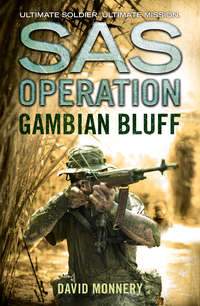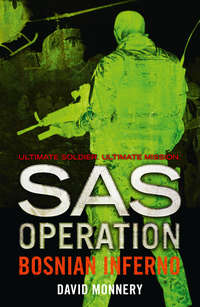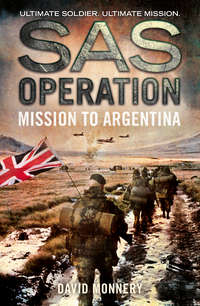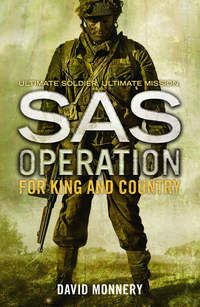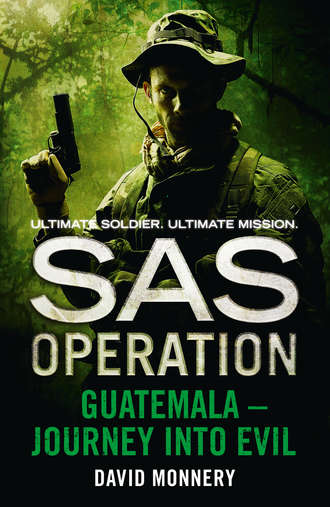
Полная версия
Guatemala – Journey into Evil


Guatemala – Journey into Evil
DAVID MONNERY

Published by HarperCollinsPublishers Ltd
1 London Bridge Street
London SE1 9GF
www.harpercollins.co.uk
First published in Great Britain by 22 Books/Bloomsbury Publishing plc 1996
Copyright © Bloomsbury Publishing plc 1996
Cover layout design © HarperCollinsPublishers Ltd 2015
Cover photograph © Collaboration JS / Arcangel Images
David Monnery asserts the moral right to be identified as the author of this work.
A catalogue copy of this book is available from the British Library.
This novel is entirely a work of fiction. The names, characters and incidents portrayed in it are the work of the author’s imagination. Any resemblance to actual persons, living or dead, events or localities is entirely coincidental.
All rights reserved under International and Pan-American Copyright Conventions. By payment of the required fees, you have been granted the non-exclusive, non-transferable right to access and read the text of this e-book on screen. No part of this text may be reproduced, transmitted, down-loaded, decompiled, reverse engineered, or stored in or introduced into any information storage and retrieval system, in any form or by any means, whether electronic or mechanical, now known or hereinafter invented, without the express written permission of HarperCollins.
Source ISBN: 9780008155452
Ebook Edition © December 2015 ISBN: 9780008155469
Version: 2015-11-04
Contents
Cover
Title Page
Copyright
Chapter 1
Chapter 2
Chapter 3
Chapter 4
Chapter 5
Chapter 6
Chapter 7
Chapter 8
Chapter 9
Chapter 10
Chapter 11
Chapter 12
Chapter 13
Epilogue
OTHER TITLES IN THE SAS OPERATION SERIES
About the Publisher
1
Tomás Xicay reached out a hand to shake his sister by the shoulder, then hesitated for several seconds, reluctant to disturb the rare serenity of her face. In the thin wash of moonlight seeping down through the forest canopy she looked almost a child once more, and seeing her like that he felt threatened by an avalanche of memories. Emelia was now a woman of twenty-two, but she had been only eight, and he fourteen, when both had been orphaned by their mother’s murder, and Tomás doubted whether he would ever shake the sense of paternal love and obligation which he still felt for his sister.
He smiled to himself and shook Emelia’s shoulder. Her eyes opened at once, and her head lifted off the Spanish grammar she had been using as a pillow. The condition of the book’s cover, streaked with layers of dirt and warped by damp, suggested that this was far from the first time that it had been pressed into such service.
‘It’s time,’ he whispered.
‘Right.’ She pulled herself into a sitting position, conscious of the activity in the shadows around her. She felt hungry, but that was nothing unusual.
As if in response to the feeling, Tomás handed her a peanut-butter cracker. ‘There’s only two more left,’ he said.
‘I can’t wait for breakfast,’ she replied wryly, easing herself on to her haunches and nibbling at the cracker.
He grinned, ruffled her hair, and moved on to check out the rest of the unit. ‘Ready?’ he asked each compañero and compañera. Some grunted assent, some offered a nervous ‘yes’, some gave him only a grim smile.
Two minutes later the column of thirteen was on the move, threading its way down through the trees. Each ‘compa’ concentrated on keeping the correct distance behind whomever he or she was following, short enough not to lose contact in the dark, long enough to maximize the number of survivors if the unit walked into an ambush. All around them the forest lay in virtual silence – there was no breeze to stir the branches, and most of the wildlife was holding its breath while the humans went by. Only the bats seemed indifferent to the guerrillas’ passage, and every now and then Emelia could hear the dry rustle of wings or see a dark shape glide across a small patch of moonlit sky. She loved times like this, when the natural world seemed to reach out and embrace her with its wonders.
Fifty metres further down the trail, Tomás was thinking about what awaited them in the small town of Tubiala, some six kilometres and ninety minutes away. He had every confidence in the Old Man’s abilities as a tactician and a strategist, but his own experience over the past five years had prepared him to expect the unexpected, which could be anything from a sprained ankle to the loss of half a unit.
The threat of sudden death was hardly inviting, but what Tomás dreaded far more was that his sister should be taken alive, and should suffer before death in the terrible way that their mother had suffered. Sometimes this fear would wake him with a dreadful start in the forest, and he would only just stop himself crying out. At such moments he would want to take Emelia back across the mountains and into Mexico, away from this land which had already brought their family such pain. But the sunrise always brought hope to set against the fear, and in any case he knew she would never agree to leave. This land was their home, to live or die for.
The unit marched on, down the long, forested slope to where the trail joined one of the many icy streams that tumbled down from the Cuchumatanes mountains. Stretches of their path were now open to the sky, but the moon had already set behind the peaks across the valley, and the darkness was deepening by the minute. For the next few hours they would be as invisible as any group of fighters could hope to be.
It was shortly after eleven when Tomás rounded a bend in the trail and saw Tubiala spread out in the valley below. There were only a handful of dim lights still burning in the small town, but the yellow glow from the illuminated military camp on the nearby rise seemed to suffuse the whole valley. He allowed the column to close up, so that each man and woman would have the chance to bring together the maps in their minds with the reality below.
After a final exchange of encouraging smiles and embraces the column moved off downhill again. The first small group to split off from the main body comprised Geraldo and Alicia, who had been entrusted with the unit’s only heavy weapon, an old but still efficient Israeli mortar which had been captured from the Army a couple of years earlier. Their task was to target the military camp, but to open fire only in the event of a general alarm being raised.
The next to leave were Carlos and Fernando, whose job was to cover the road winding west down the valley towards Champul. They were followed by Elena and Rosa, who had drawn guard duty on the road east, which joined Tubiala to the garrison town of San Juan Cotzal. That left seven compas for the Hotel Tezulutlán, two to cover each entrance and three to go in for Muñoz. Tomás had chosen José and Jorge to accompany him on the latter mission.
The seven waited just above the town for ten minutes, giving the road-watchers time to reach their positions, and then slipped between the first houses and on to the steep dirt track which led down towards the church. A dog barked away to their right, and another replied to the left, but there was no sign of life in the houses, and no movement on the streets.
They edged along the side of the small, whitewashed church, and Tomás gingerly edged an eye round its corner to check out the small square which lay at the heart of the town. It was empty, but beyond it, a few metres down the San Juan Cotzal road, he could see two figures sitting on either side of a kerosene lamp outside the front door of the hotel. They seemed to be playing a game of some sort.
So far, so good, Tomás told himself. If there were soldiers outside the hotel, then Muñoz was most probably inside. Tomás wondered whether it was arrogance or simple stupidity which had brought the major to the conclusion that he could leave the safety of the military camp with impunity. According to their informant, the man received almost daily deliveries of luxury items from his family in the capital, and had turned the upper floor of the town’s only hotel into a sort of court-in-exile. He hardly ever set foot in the military camp, preferring to summon his subordinates to the hotel for their instructions. And only the sadistic thrill of a punitive action was capable of luring him out into either the town or the countryside which surrounded it.
Hopefully, Tomás thought, Muñoz will shortly be receiving an overdue lesson in humility. A last lesson.
He turned back to the others, gave them the hand signal for ‘things as expected’, and led them silently around the perimeter of the dark square. On the far side he chose Emelia and Cristobal, the unit’s two best marksmen, for the task of watching the two sentries, and then led the other four through a space full of empty market stalls and down a narrow alley to the back of the Tezulutlán. There he paused, straining his ears for any unexpected sounds.
There was only silence. Tomás led the way in through the back door, and Jorge followed, with José bringing up the rear. The three men crept through the darkened kitchen, past two young boys asleep on the mats beneath the stove, and into the corridor which housed the reception desk. Light from the sentries’ kerosene lamp glowed in the window beside the hotel’s front door, revealing two more under-age employees curled up on the floor. As Tomás turned up the stairs he heard the two guards outside suddenly convulse with laughter at some private joke.
The carpet on the stairs was worn almost to extinction, but enough of it remained to muffle the sound of their footfalls. Tomás carefully lifted his eyes to the level of the upper floor, and found an empty corridor lit by a kerosene lamp. All he could hear was the sound of his own heart beating like a drum.
He signalled to the other two to wait, and stealthily advanced down the corridor to where the lamp was hanging from a piece of bent wire. He reached up, lifted the glass, and blew out the flame.
In the darkness he could see a faint light shining out from under one of the doors – the one which they had been told Muñoz used for a bedroom. And suddenly he could hear the sounds of sobbing coming from inside the room.
He tiptoed towards the door, gesturing to the others to follow. With his ear up against the wood he could hear a low male groaning intermingled with the sobbing. As Jorge unsheathed his machete, Tomás took his army revolver in one hand and started turning the doorknob with the other. He slowly eased the door open half an inch, and applied an eye to the room beyond.
The first thing he noticed was two wide and frightened eyes staring straight up at him. The girl was lying on the floor, half-wrapped in a blanket, but apparently naked. She made no sound, but quickly turned her head to the bed behind her, where another girl, barely into puberty, was rocking to and fro astride a naked man. She was sobbing steadily, the tears running down her half-developed breasts and on to his glistening chest, while he groaned with pleasure, eyes closed and hands tightly gripping her haunches.
As Tomás slowly pushed the door back the second girl also caught sight of him, and the motion of her body faltered, but only for a second. Two more thrusts of her small body kept Muñoz in blissful ignorance, until Tomás was over the bed and lifting her off, and then the major’s eyes opened, only to find three men standing over him and Jorge’s machete poised beside his erect penis.
The latter wilted, but before Muñoz could offer so much as a whimper José had stuffed a pair of convenient underpants into his mouth. Meanwhile Tomás was trying to talk to the two girls. The one who had been lying on the floor was trying to both dress and comfort the other girl, who was still sobbing with a quiet intensity which almost broke his heart. The elder girl explained that both of them came from a village down the valley which the Army had visited the previous week.
Tomás asked her if they wanted to go home or come into the mountains with the compas. They wanted to go home. They knew the Army would visit their village again, but they couldn’t just leave their families without giving them warning. If the villagers were expecting trouble then all but the eldest could be sent into the mountains, at least for a time. Tomás didn’t argue with her, but he did insist that Jorge escort them out of the hotel and through the town’s backstreets to the Champul road.
Having forced a shirt over Muñoz’s head, pulled a pair of trousers up his legs, and tied his hands behind his back, José was now looking around the room, an angry expression on his face. A portable television sat on a small table next to a pile of glossy American sex magazines. There were empty wine bottles everywhere, and there seemed to be enough items of food scattered across the floor to feed most mountain villages for a week.
‘Ready?’ Tomás asked, picking up the major’s belt with its holstered handgun and fastening it around his own waist.
José nodded, and grabbed Muñoz by one of his pinioned arms. ‘Any sound and your life is over,’ he whispered in Spanish, and two eyes stared blankly back at him. The man was in shock, Tomás realized – he couldn’t believe that this was happening to him. In a matter of minutes Muñoz’s future had turned from bright to non-existent.
They walked down the stairs, the major none too steadily. The soldiers outside were still playing their game, oblivious to events within, but the sleeping staff had been awakened, by either the noise or some instinct of solidarity. They watched wide-eyed as the prisoner was led through the lobby and kitchen and out by the back door.
A few minutes more, and all the compas were withdrawing from their positions around the sleeping town, slipping back up the hillside towards the spot where Geraldo and Alicia waited beside the mortar. Once gathered, the unit began its return journey, moving uphill as fast as the terrain allowed, the higher reaches of the Cuchumatanes looming above them like a huge rampart beneath a swiftly clearing sky. In the middle of the column, like an animal incapable of understanding the terrible depth of its unhappiness, Major Alfonso Lujan Muñoz stumbled along, a continuous soft mewling emanating from his gagged mouth.
Five days later, Colonel Luis Serrano, Operations Director of G-2 Military Intelligence, was standing at the window of his study, staring out at the garden. It was a beautiful dry-season afternoon, with hardly a trace of smog to besmirch the clear blue sky, and for once the brilliant colours of the various flowering plants seemed to justify all his wife’s battles with a never-ending series of new gardeners. She was away at the moment, visiting her sister at the Lake Atitlán villa, but their only daughter was with him, supposedly studying for upcoming examinations. From where Serrano stood, he could see her hard at work on an even tan, lying face down on a towel beside the pool, the top of her bikini untied.
Behind him, in the shadowed study, the tape continued to roll.
‘Do you remember the man Miguel Ustantil, who you ordered arrested in July last year?’
‘Yes.’
‘Why was he arrested?’
‘He was a troublemaker.’
‘Can you be more specific?’
The interrogator’s voice was so calm, Serrano thought, almost Buddha-like. There was no anger, or at least none on the surface. It was as if he had accepted everything on the general level, and was only now concerned with getting the details right. But was he really ‘El Espíritu’, ‘The Ghost’?
‘Did you personally supervise the flaying of his facial skin?’
‘Yes.’
Why had the idiot admitted it all? Serrano asked himself. He had been over Muñoz’s service record, and found nothing to indicate such a level of stupidity. He wondered what the bastards had done to turn the man to jelly and make him sound like an I-speak-your-weight machine. Whatever it was, it had left no marks on the body, and the subversivos’ choice of dumping ground – on the steps of the Swedish Embassy – had not given Serrano’s men the chance to add any.
In PR terms the whole thing had been a disaster. Copies of the tape had been delivered simultaneously to a dozen or so embassies and all the prominent human rights groups, leaving G-2 with very few options in the matter of damage limitation. Serrano’s superiors had not been amused.
He found himself wondering once more if it really could be El Espíritu. The man was supposed to have died over ten years ago, though admittedly his body had never been properly identified. Even so…The most reliable witnesses had estimated his age at over sixty in 1980, and the average life expectancy of the most docile Indians was not much more than fifty. It was hard to believe…
But the tape certainly bore the man’s mark. It wasn’t just a catalogue of Muñoz’s overzealous interrogations and punishments – in several of the incidents under discussion the man asking the questions was very careful to draw out why the Army had become involved, and exactly which interests – or, to be more precise, the interests of which landowners – they were seeking to promote.
But then again…
Serrano smiled to himself. The foreign press were not interested in why – they were too busy wallowing in hacked-off hands and breasts and gouged-out eyes. None of them got the point, which was that keeping a primitive people under control necessitated the use of primitive methods.
It was possible, of course, to go too far…
‘Why did you take the six men back to San Benito?’
‘To show the villagers of the region what lay in store for them if they made trouble.’
‘You had them stripped naked, and each man was held erect while you pointed out the various wounds on their bodies – the wire burns and cigarette burns, the severed ears, the split tongues, the hands with no nails and the feet with no soles …’
‘Yes.’
‘And then?’
‘They were executed.’
‘How?’
‘They were burnt.’
‘You had your men pour gasoline over them and set fire to them?’
‘Yes.’
That was Muñoz’s last word on the tape, and for all Serrano knew his last on this earth. Guerrilla voices read brief extracts from the Geneva Convention and some UN-sponsored accord on human rights – the pompous bastards! – before the voice of the questioner pronounced sentence. There was an eerie gap of several seconds, and then the sound of a single gunshot. Serrano had heard the tape through twice before, and was expecting it, but the report still made him jump.
In the garden outside, his daughter had turned over, and was treating her bare breasts to the afternoon sunshine. Behind her the Indian gardener was absent-mindedly scratching his behind as he directed the hose at the scarlet bougainvillea.
Serrano decided he needed to know more about the history of ‘The Ghost’.
The following day, shortly one o’clock, Chris Martinson was sitting in Antigua’s Restaurant Dona Luisa, waiting for his lunch to arrive. The place was as crowded as usual, with a clientele about equally divided between locals and gringo tourists, but Chris had managed to get the seat he wanted, on the terrace overlooking the interior courtyard. On the previous day a bird he had not recognized had paid an all-too-brief visit to the ornamental palm below, and he was hoping for a repeat performance.
He turned to one of the two newspapers he had just bought in the square, the one printed in Spanish, and started reading the lead story.
According to the Guatemalan Daily Planet an elaborate hoax had recently been played on those members of the international press corps who liked to defame the nation’s security forces. Subversivos responsible for the murder of Army Major Alfonso Lujan Muñoz had fabricated a tape purporting to contain an interrogation of the young major, and a counterfeit admission of guilt in regard to certain crimes, all of which were known to have been committed by the subversivos themselves. Unfortunately for the perpetrators of this vicious hoax, voice identification experts had been able to establish that the speaker on the tape was not in fact Major Muñoz.
‘And there goes another flying pig,’ Chris murmured to himself. He reached for the Daily News, the English-language newspaper for tourists and Guatemala’s resident British and American community, and looked for another account of the affair. He expected to find at least a different slant – the Daily News, for reasons which no one seemed able to fathom, was allowed a unique latitude when it came to criticizing the authorities.
Sure enough, the writer managed to pour scorn on the official version of the story without directly contradicting it. ‘We can only wonder,’ he wrote, ‘that after forty years of incessant defeat the subversivos should still have the leisure time, the technology, and the system of communications necessary, to mount such an elaborate hoax.’
Chris smiled to himself, and cleared a space for the arriving chicken sandwich and papaya licuardo. The trouble with Guatemala was that most of the time it was hard to believe the evidence of your own ears and eyes. The accounts of atrocities committed by both sides were probably exaggerated, but he had no reason to believe that they were imaginary. And yet the country was so eye-achingly beautiful, and not just in the matter of landscape. Costa Rica, which Chris had visited several years earlier, had beautiful countryside, but compared with Guatemala it seemed somehow bland, two-dimensional.
It was the people who made Guatemala magical, the Mayan Indians, though how they did it was hard to say. They certainly looked picturesque in their colourful traditional costumes, and their religious ceremonies seemed like a fascinating glimpse into an earlier world, but it was more than that. Something to do with the depth of their commitment to the reality of community, perhaps. An American whom Chris met had argued that Westerners here somehow just locked on to the missing piece of their own social jigsaw – a sense of belonging. Here among the Mayans, he claimed, it had somehow miraculously survived.
Chris wasn’t sure he agreed, but he had yet to hear a better explanation. Every gringo he had talked to since his arrival had felt the same sense of magic. The only people who didn’t, or so it seemed, were the Ladinos, the Spanish-speaking non-Indians who made up thirty per cent of the population and one hundred per cent of the ruling elite.
Certainly the family Chris was staying with as part of his language course had little good to say about the Indians or their culture. Their ambitions were all directed towards total submersion in the wonders of the West. Exciting memories of visiting the McDonald’s in Guatemala City vied with distress at there not being one in Antigua.


